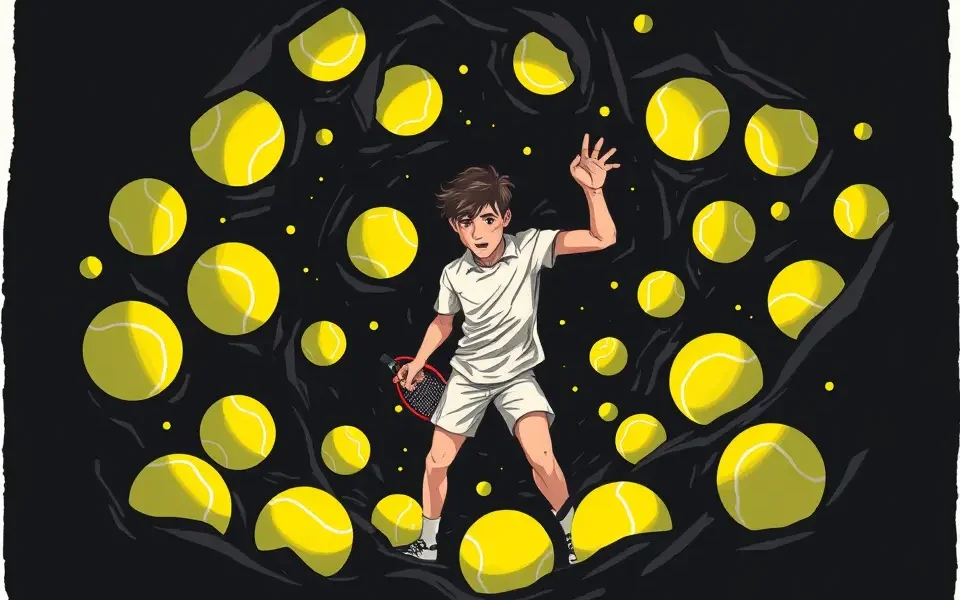Tennis legend Boris Becker has voiced serious concerns about the intense demands placed on Carlos Alcaraz, urging the young Spaniard’s team to reconsider their approach. At just 21, Alcaraz is already one of the sport’s biggest stars, but Becker fears that the pressure and expectations could lead to burnout or even mental health issues.
Becker’s Concerns: A Deep Dive
Becker’s warning comes at a time when Alcaraz has been open about the challenges of maintaining his motivation and focus throughout the grueling 11-month tennis season. In a recent podcast with Andrea Petkovic, Becker revealed that Alcaraz had contemplated taking an extended break from tennis following a defeat in Miami, citing emotional and physical exhaustion.
“We’re talking about a 21-year-old who couldn’t cope with the expectations and the pressure anymore,” Becker remarked. “We’re talking about mental health.” He further highlighted that Alcaraz “almost reached the point of depression,” emphasizing the need for his team to evaluate whether they are demanding too much from such a young player.
Becker isn’t alone in his assessment. Many observers have noted Alcaraz’s packed schedule, which includes not only major tournaments but also promotional obligations and exhibition matches. This constant cycle of competition can be unsustainable, potentially jeopardizing his long-term career.
The Pressure Cooker of Professional Tennis
The life of a top-ranked tennis player is far from glamorous. It involves:
- Relentless Travel: Players spend most of the year on the road, jetting from one tournament to another across different continents.
- Intense Competition: Every match is a high-stakes battle, with immense pressure to perform at their best.
- Media Scrutiny: Top players are constantly in the spotlight, with their every move analyzed and scrutinized by the media and fans.
- Commercial Demands: Endorsements and sponsorships add further pressure, requiring players to fulfill promotional obligations alongside their training and competition schedules.
For a young player like Alcaraz, navigating this complex world can be overwhelming. The pressure to maintain their ranking, win titles, and fulfill commercial commitments can take a significant toll on their physical and mental well-being.
The Alcaraz Schedule: A Closer Look
Alcaraz’s schedule in recent years exemplifies the intense demands placed on top players. Besides competing in major tournaments like the Grand Slams, ATP Masters 1000 events, and the ATP Finals, he has also participated in various exhibition matches and promotional events.
While these exhibitions can be lucrative, offering substantial appearance fees, they also add to the overall workload and reduce the time available for rest and recovery. Becker has specifically pointed out that Alcaraz’s team may be prioritizing financial gains over his long-term health and success.
Examples of Alcaraz’s Busy Schedule:
- Netflix Slam: A high-profile exhibition match against Rafael Nadal in March 2024.
- Laver Cup: A team competition featuring some of the world’s top players in September 2024.
- Six Kings Slam: An exhibition event in Saudi Arabia in October 2024, offering significant appearance fees.
- Exhibitions in the USA: Two exhibition matches in Las Vegas and Charlotte in December 2024, following the Davis Cup Finals.
This packed schedule leaves little room for rest and recovery, increasing the risk of burnout and injuries.
The Risk of Burnout and Injury
Becker’s concerns are rooted in the very real risk of burnout and injury that comes with overexertion in professional tennis. The sport has witnessed numerous promising careers cut short due to these factors.
Burnout
Burnout is a state of emotional, physical, and mental exhaustion caused by prolonged or excessive stress. In tennis, it can manifest as:
- Loss of Motivation: Players may lose their passion for the game and struggle to maintain their focus.
- Decreased Performance: Burnout can lead to a decline in performance, with players struggling to compete at their best.
- Mental Health Issues: In severe cases, burnout can contribute to anxiety, depression, and other mental health problems.
Injury
Overexertion can also increase the risk of injury. Constant training and competition can put a strain on the body, leading to:
- Muscle Strains and Tears: Overuse and lack of recovery can make muscles more susceptible to injury.
- Stress Fractures: Repetitive stress on bones can lead to stress fractures, particularly in the feet and legs.
- Joint Problems: The repetitive motions of tennis can cause wear and tear on joints, leading to problems like tendinitis and arthritis.
Alcaraz’s recent withdrawal from the Madrid Open due to a hamstring injury serves as a stark reminder of the physical toll that tennis can take on the body.
Becker’s Advice: Prioritize Titles and Longevity
Becker’s advice to Alcaraz’s team is clear: prioritize titles and longevity over short-term financial gains. He believes that Alcaraz has the potential to be one of the greatest players of all time, but only if his career is managed carefully.
“His team needs to focus less on the money and more on titles and the world rankings,” Becker said. “Sure, he gets seven-figure appearance fees for show fights in the off-season, but coaches and managers simply have to protect him better.”
Key Recommendations:
- Strategic Scheduling: Carefully plan Alcaraz’s tournament schedule, prioritizing major events and allowing for sufficient rest and recovery periods.
- Reduced Exhibition Matches: Limit participation in exhibition matches, focusing instead on tournaments that contribute to his ranking and legacy.
- Focus on Training: Ensure that Alcaraz has ample time for focused training, allowing him to improve his game and maintain his physical condition.
- Prioritize Mental Health: Provide Alcaraz with the support he needs to manage the pressure and expectations of professional tennis, including access to mental health professionals.
Protecting Alcaraz: A Collective Responsibility
Becker’s call to protect Alcaraz extends beyond his immediate team. He believes that the entire tennis community has a responsibility to ensure that young stars are not pushed too hard.
“We have to protect Carlos from himself,” Becker urged. “But the point is that you can see that he’s overexerting himself, he does too much and I really hope that whether it’s his coach or his manager or his father, they need to communicate, because we still need him in ten years.”
The Role of the ATP
The ATP (Association of Tennis Professionals), the governing body of men’s tennis, also has a crucial role to play in protecting players’ health and well-being. This could include:
- Reviewing Tournament Schedules: Ensuring that the tournament calendar is not too demanding, with sufficient breaks between events.
- Enforcing Rest Periods: Implementing mandatory rest periods for top players, preventing them from playing too many consecutive weeks.
- Promoting Mental Health Awareness: Raising awareness of mental health issues in tennis and providing resources for players who need support.
Alcaraz’s Perspective: A Young Star’s Struggle
Alcaraz himself has acknowledged the challenges of the demanding tennis season. He has spoken openly about the pressure to perform and the difficulty of maintaining his motivation throughout the year.
In the past, Alcaraz has expressed concerns about the grueling nature of the tennis schedule, even suggesting that “they are going to kill us in some way.” These comments highlight the need for a more sustainable approach to the sport, one that prioritizes players’ health and longevity.
Balancing Ambition and Well-being
Alcaraz’s situation underscores the delicate balance that young athletes must strike between ambition and well-being. While the desire to win and achieve greatness is understandable, it should not come at the expense of their physical and mental health.
Ultimately, the decision of how to manage his career lies with Alcaraz and his team. However, Becker’s warning serves as a valuable reminder of the potential pitfalls of overexertion and the importance of prioritizing long-term health and success.
The Future of Alcaraz: A Promising Yet Uncertain Path
Carlos Alcaraz is undoubtedly one of the most exciting talents in tennis today. His electrifying style of play, athleticism, and unwavering determination have captivated fans around the world.
However, his long-term success will depend not only on his talent and hard work but also on how well his career is managed. By heeding Becker’s warning and prioritizing his health and well-being, Alcaraz can ensure that he remains a force in tennis for many years to come.
A Call for Change
Boris Becker’s concerns about Carlos Alcaraz’s workload highlight a broader issue in professional tennis. The sport’s demanding schedule and relentless pressure can take a significant toll on players, particularly young stars who are still developing.
By taking steps to protect players’ health and well-being, the tennis community can ensure that the sport remains sustainable and that future generations of players can thrive without sacrificing their physical and mental health.








No Comment! Be the first one.